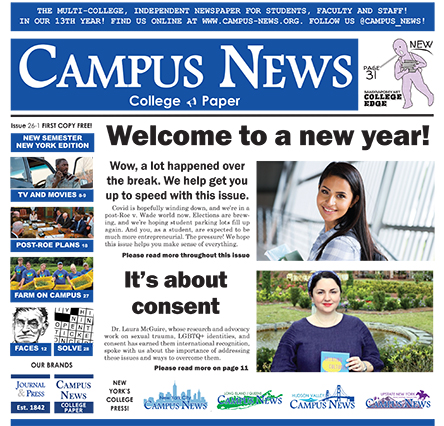By Meesha Ryan
Campus News
Questions of consent and boundaries arise in nearly every aspect of our lives, and for many young adults, facilitating these conversations can be daunting. Dr. Laura McGuire (pictured), whose research and advocacy work on sexual trauma, LGBTQ+ identities, and consent has earned them international recognition, spoke with me about the importance of addressing these issues and ways to overcome them.
Dr. McGuire began by studying education and social justice work, hoping to merge those subject areas in their future career. They became a teacher for high school and middle school students during which time they focused on how they could help students empower themselves. They later switched to sex education and concentrated on the intersections of trauma and marginalized identities. Over the course of their career, Dr. McGuire has created programs for sexual misconduct and response, and written books addressing related topics. Their book, Creating Cultures of Consent (2021), is directed towards the parents and teachers of young people such as high school students whereas The Sexual Misconduct Prevention Guidebook (2022), is tailored for administrations and colleges, providing them with information on how to “amplify student voices so that they get the support they need.”
Though it is a strong opportunity for young adults to receive information about consent, the sexual misconduct prevention and support that colleges provide their students often leaves them with significant gaps to bridge. Dr. McGuire emphasized the well-documented research which shows that transgender women of color are the most likely to experience violence on-campus; despite this, they are frequently left out of the conversation, along with other heavily impacted groups. This sends a damaging message, reinforcing negative perceptions of self as well as the harmful idea that these students are not deserving of support. Dr. McGuire notes that, to make matters worse, a lack of training and discussion of these topics may leave administrators and professionals without much understanding of these students and their experiences.

However, Dr. McGuire explained that “most of these conversations are really taking place between peers…Sometimes they’re going to their professors, sometimes they’re going to a Title IX Coordinator or a therapist…but that’s rare. More often than that they’re going to ask their friends.” This can be challenging, especially because the questions that are raised frequently involve multiple aspects of a young adult’s life: What do they do if a friend tells them that they cannot remember what happened last night? Is it consensual for them to sleep with someone if one or both of them are not sober? When is it appropriate to have these kinds of intimate conversations? “Students have so much power in this space,” Dr. McGuire says, “…we would be doing a major disservice [to students]” if we left that message out of our discourse; a large body of work has pointed toward positive peer pressure as a crucial element of sexual misconduct prevention. Being forward with their friends about what behaviors they do or do not support can help promote safe, respectful practices among students. Although students themselves cannot be the therapist or Title IX Coordinator that their peers may need, they should feel capable of directing their friends towards good resources.
So, what exactly can young adults do to prepare themselves for these moments? Dr. McGuire says that it can be helpful to find well-vetted resources and use them to start conversations. One way to confirm that resources are legitimate would be to research the background of the people who created the resources. Professors, researchers, and teachers tend to have some information about their credentials available online on websites or social platforms like LinkedIn. If, for example, someone found a TikTok that they want to know more about, they can trace the information back to sources such as research studies that may go into greater depth. Students should also feel empowered to push for changes, express what they want to see from their administration, and to bring in resources themselves.
Young adults are also encouraged to share what they learn with the people around them. Maybe they have a friend who is not in college but would benefit from having access to the misconduct prevention resources that their college provides. Students can bring these discussions to their peers through conversation; if their college allows it, they can also bring their friends with them to hear from speakers and attend events. Dr. McGuire emphasizes that these lessons are not just about sex, but they include all interpersonal relationships, “consent education is a life skill.” They encourage young adults to talk to the children in their lives as well. Starting these conversations early can help children build an understanding of bodily autonomy, and how to interact safely and comfortably with other people.
In the future, Dr. McGuire is hoping to focus their work on companies and the workforce. They are interested in what happens when students go into work after school, and how they can find supportive, informed workspaces. If you are interested in learning more about navigating consent and boundaries, we encourage you to take a look at Dr. McGuire’s books, available for purchase on popular book sites, including Amazon.







Facebook Comments